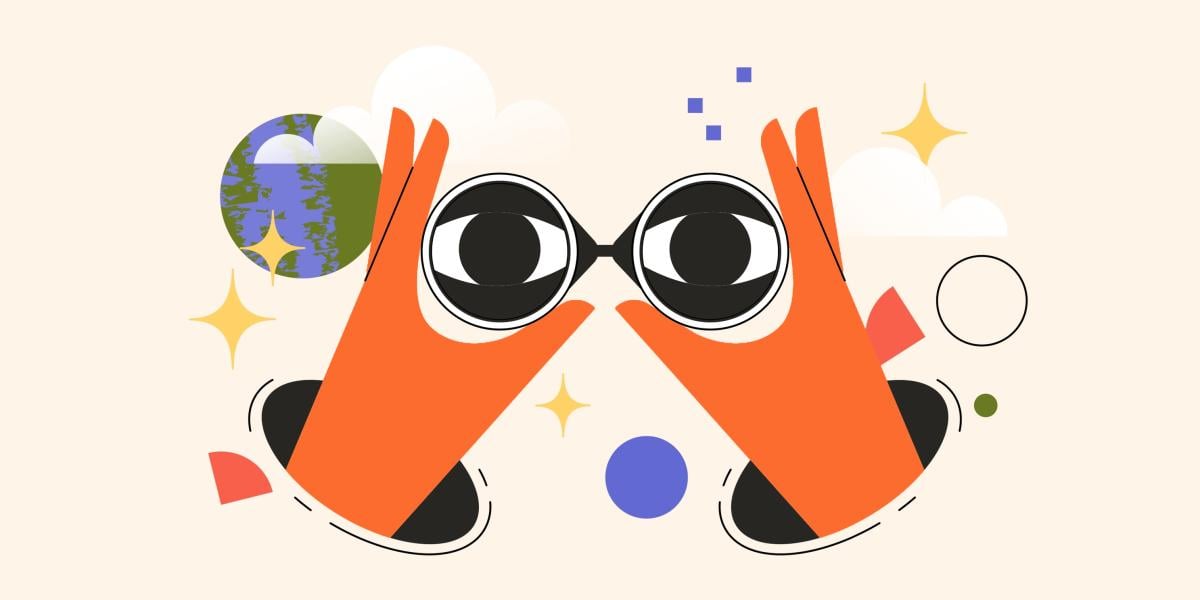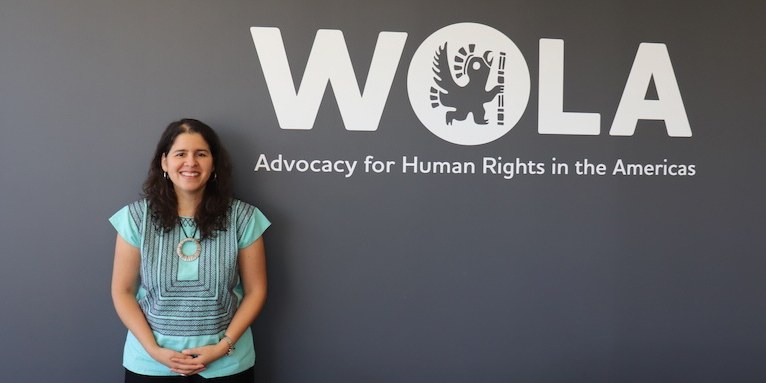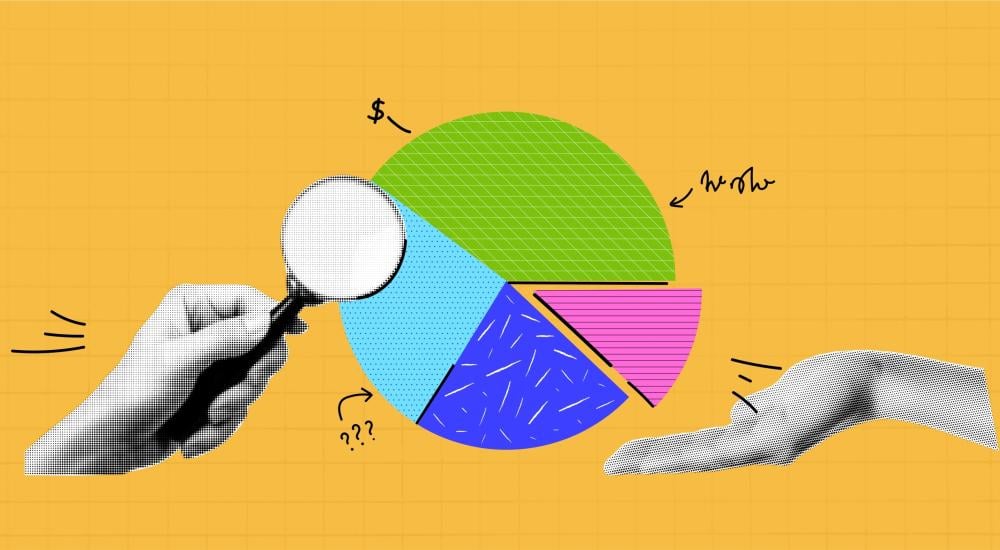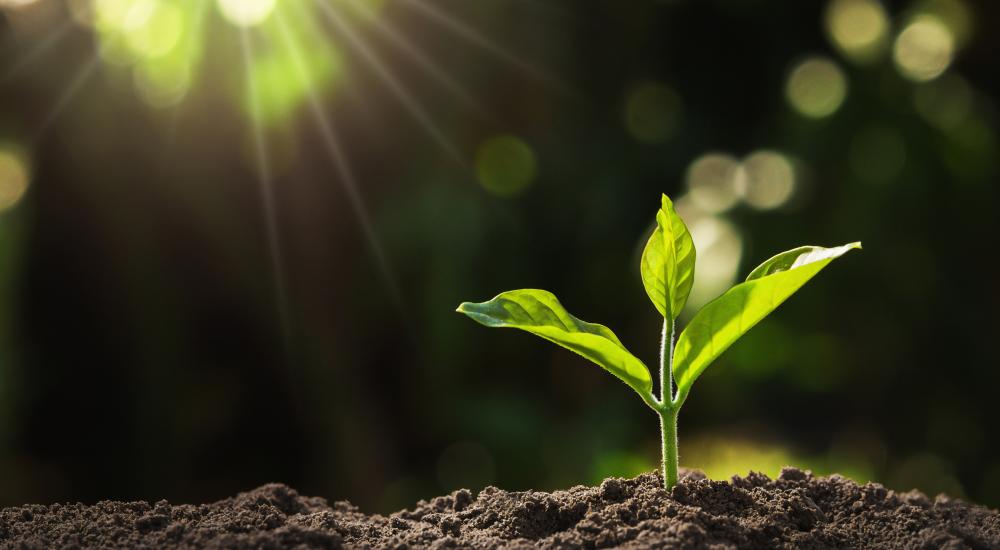Carolina Jiménez Sandoval: Curiosity and Empowerment

With a career as a human rights advocate and researcher and current role as president of the Washington Office on Latin America, Carolina Jiménez Sandoval’s global journey began in high school as an exchange student to the United States. Since then, she has pursued global education opportunities in Japan, the United Kingdom, and her home country of Venezuela.
In celebration of Women’s History Month, International Educator spoke with Jiménez Sandoval about her international education experiences, the intersection of human rights and education, issues she follows in Latin America, and how she keeps hope amid challenges.
Editor’s note: This interview has been edited for clarity and length.
You were an exchange student in high school with AFS. Can you to tell us about that experience? How did it shape your perspective and your worldview? In what ways did it put you on a path to have other global education experiences?
To be honest, I would say it changed my life. First of all, I was very young. I had lived in my hometown since I was born, and I was 16 when I became an AFS exchange student. I only spoke Spanish at that point. I come from a small city in Venezuela on the western side of the country, so I wasn’t exposed to people from other countries as much. I knew foreigners, but I hadn’t been in contact with so many international students before I joined the AFS program.
So, I moved to the United States, and it was a learning in life experience. First, because I was confronted with a different language. I think learning another language was key in my personal and professional development. But then learning about cultural differences was as key as learning another language. Being exposed to a different society and to international students sort of opened my mind in ways that would not have been possible had I not been able to have that experience.
My curiosity exploded. ... Curiosity then became a normal part of my learning process. And I think it’s impacted my life ever since.
There are a lot of seeds that your family or your own life experience plants in you. I was naturally curious, and my mother and my grandmother had always told me, “It’s important that you go to university,” because they didn’t have the opportunity to go. I’m the first woman in my family to have attended university. I had all these seeds, and when I was brought to another culture and to another country, and to learn another language and to understand another reality, the trees started to grow [from those seeds]. My curiosity exploded. I wanted to learn about the United States. I wanted to learn another language. I wanted to learn about my friends’ countries. Curiosity then became a normal part of my learning process. And I think it’s impacted my life ever since.
What were the most important things or lessons you learned during that experience, or in your other global education experiences, that have impacted your work today and served you in your career?
Understanding that our differences do not make and do not need to make us distant. What might be [one] color for you might be another color for me, although we’re seeing the same thing. It can be very hard, especially these days, as the world faces extreme polarization in many societies. It can be easier just to stay within your bubble and avoid talking to those who think differently—and, in the worst-case scenario, to judge them strongly and to make them your enemies.
Understanding that our differences do not make and do not need to make us distant.
This goes well beyond just not wanting to talk to someone who has a different point of view. But in these types of [global education] experiences, when you are exposed to people who think differently from you, you do realize that you need to be open to different perspectives, even if they can be very different from what you believe. Also, [I learned to] become not just tolerant but more understanding that these differences exist and how we often need to find a middle ground and agree sometimes to disagree. In general, this [understanding] makes you less likely to fall into the traps of polarization and doesn’t let you be prejudiced. And that is very necessary for the social fabric to exist.
You’re the definition of a global citizen, having lived in and had educational experiences in Japan, Venezuela, the United Kingdom, and the United States. What does the term “global citizen” mean to you, or even the idea behind that term?
It’s a wonderful question, because at the very end of the day, it goes back to what philosophers have been asking for centuries: What is at the center of everything and what makes our communities and their social fabric exist and develop at all levels? Some will say “the self.” And who is the self? We are the self. And the truth is that on the one hand, where you are born largely conditions who you are and who you can be—but also gender, the political system, socioeconomic status also conditions a lot of what you are and what you can be. Yet, when you think about the definition of a global citizen or what it means to have global citizenship, you realize that all those elements can be less defining than we expect them to be.
Someone from the western region of Venezuela might have more in common with a Colombian than with someone from [Caracas], the capital. And the same will go for Europe, where borders do not necessarily reflect cultural affinity and sense of belonging. The same will go for the United States and almost everywhere in the world. Borders, socioeconomic status, biological sex or gender identity—these are all concepts that are being contested now. And because they are contested, we go back to the question philosophers have been posing and responding to: the human being as the center, together with our natural and social ecosystem.
That’s what a global citizen really is.... [It] is about that possibility of contesting some defined destiny of what could make you more global.
And I think that’s what a global citizen really is, more than knowing different languages or living in different countries, which of course makes you more aware of international politics and different cultures. But it is about that possibility of contesting some defined destiny of what could make you more global. Especially if you are a woman from the Global South, you contest those concepts; you contest the concept of nationality or the concept of sex or the concept of socioeconomic status, and you try to reach for more. And that [act of] contesting and pushing those boundaries to understand the world, to be part of it from your own lived experience, is what I think makes you a global citizen.
You obviously had a very formative experience as a 16-year-old. For students, whether they’re in high school or in college—or even people early in their careers—what would you tell them about the value of gaining global education experiences?
In a very pragmatic sense, it will add a lot of tools to their professional future. Languages, opportunities for higher education, connections, and a more expanded network. That is the very pragmatic and very real impact that these types of experiences have on your career. And they are important for this highly competitive world in which we live. I think people need to realize that.
But then, at a more individual, personal, human level, they add many other layers. If these experiences are enjoyed and well lived, they add depth to our thinking. Because you don’t take just one perspective as an answer. You ask different questions and you get different answers. And then you make your own assumptions with your own beliefs, or even better, you question your own beliefs. It adds tolerance and love for diversity, an embrace of diversity as a core principle in your life. In a world that continues to become more and more affected by political and social polarization, embracing diversity is now almost an act of resistance, when I think it should be a natural reflection of who we are as humans. These types of experiences help you understand this important concept better.
In a world that continues to become more and more affected by political and social polarization, embracing diversity is now almost an act of resistance, when I think it should be a natural reflection of who we are as humans.
On a very personal level in my life, those different experiences in other countries and in international universities have given me some of the most wonderful friends that I have had. And friendship should never be an underrated concept. It is such a key part of a person’s life, the difference it makes in your journey.
Most of your career has been fighting for and ensuring human rights. Can you talk a bit about how you see the overlap or intersection of human rights and international education? Including for those who will not leave their country to have a global education experience?
The first thing I would say is that education is a human right. And we can never imply that it isn’t. Because it’s a human right, it should be promoted and guaranteed by all levels of government everywhere in the world. But then we also know that a lot of the human rights that are universal and should be protected and respected and guaranteed are not enjoyed by all. Unfortunately, education is one of them. We still have major gaps when it comes to access to education, not just in Latin America, but in many other countries and in many other regions of the world. And we have some major gender gaps as well.
I think that education, besides being a human right, is also one of the strongest forms of empowerment human beings can access, and that’s why it’s so important. Personally, that’s what it’s been for me. I was born and raised in a small city where most girls—because there is always a very big gender impact on these issues—if we were lucky, we finished high school. And many would marry very early, or wouldn’t marry, but they would have children, because pregnancy among teenagers is still very high in Latin America. So, access to a university education was already very difficult, especially if you had become a mother at 16 or 18. Trying not to fall into that situation requires public policies. At the end of the day, education needs to be both a government responsibility and also society’s duty toward its citizens. And because education empowers people, then our access to other rights depends a lot on the education that we have.
I think that education, besides being a human right, is also one of the strongest forms of empowerment human beings can access, and that’s why it’s so important. ... And because education empowers people, then our access to other rights depends a lot on the education that we have.
If you think of people who are political prisoners, you will always see that some people have support from nongovernmental organizations and politicians and their cases are heard by the international community. And it’s often because they have had some access to or connections to these organizations. The higher the level of education, usually, the more visible their case tends to be, because they are lawyers or political leaders, etc. Inequality in general affects the way we enjoy our rights, and inequality and education are two issues that are clearly very connected.
What are some of the main education issues that you follow in Latin America?
We are developing an area that is related to gender and racial justice, which are two issues that are very connected to education. In general, gender-based violence or racism or even other forms of discrimination like xenophobia are often very connected to education, or rather lack of it. In an education system that is integral and holistic, children from an early age, and then teenagers and university students, are educated in a way that they understand the universality of rights and therefore learn that discrimination is not acceptable. But if you don’t have access to formal systems of education where you are taught these principles and you internalize them, then I’m always afraid that you are more easily manipulated by authoritarian leadership, by fake news, misinformation, etc.—so I think that part is key.
But the same goes for democracy. And that’s one of the biggest issues that we are working on these days. After the very strong, brutal military dictatorships in the 1970s in several countries were over and the civil wars of the 1980s in Central America were over, the promise of democracy came to be the big promise [in Latin America]. Now, you fast forward 20 years, and unfortunately, democracy did not deliver on its promise and we actually see a lot of democratic decline. And not only do we see democratic decline in Latin America, I’m afraid that we also see democratic decline in the United States.
Democracy also needs to be taught, democratic values need to be learned.
Now, of course, we can always look at the leaders who are promoting undemocratic practices and blame them. And that is partly true. But we also need to see what citizens are doing. How much do they accept this type of leadership? How much do they believe in these leaders? Those are important questions as well. For example, in 2010, Latin Barometer, which is the largest opinion poll in Latin America, asked Latin Americans, “Do you believe democracy to be the best form of government, the one you will always support?” And 63 percent said yes. Fast forward to 2023, and only 48 percent replied yes. That 15-percent drop in the acceptance of democracy as the best possible form of government also shows a major gap in education. Democracy also needs to be taught, democratic values need to be learned.
There is a lot at stake with these pressing issues you’ve mentioned. Specifically in Latin America, where do you see growth or other things you’re encouraged by? And what are the areas that are the most concerning for you?
It’s so easy to fall into the trap of pessimism. When you look at not just Latin America but at the world these days, I think it’s very easy to feel pessimistic. People see what’s happening around us, and they feel empathy for those people who are suffering wars, hunger, torture, and all the terrible things that are happening. I feel encouraged when I look at the way many civil and social movements have been able to transform empathy into strategic empathy. By this I mean being able to create enough of a quorum and constituency to fight back against obstacles to the enjoyment of rights.
I often take the feminist movement of Latin America as an example. Latin America is mainly a Catholic/Christian region. Sexual and reproductive rights are very difficult to promote because of the power of those Catholic/Christian values and conservative social leaders from both the right and the left. Then, we had a major setback in the United States that perhaps no one ever saw coming. And yet Colombia, Mexico, Argentina—three of [the] four largest countries in the region—decriminalized access to abortion. [That] was absolutely unthinkable 10, 15 years ago. It was a lot of work, but it was a lot of coalition building, strategic work, and with a very strong participation of young people. That gives us hope.
I feel encouraged when I look at the way many civil and social movements have been able to transform empathy into strategic empathy. By this I mean being able to create enough of a quorum and constituency to fight back against obstacles to the enjoyment of rights.
The same goes for the environment. We cannot forget that the Amazon is in Latin America and not just in Brazil—the Amazon is in Peru, Colombia, Venezuela. The threats against the biodiversity of the Amazon remain great. But the way that many Latin American groups have been able to raise awareness and create a global movement to support the Amazon is very remarkable. I think we wouldn’t have been able to see that had young people not taken the fight for a clean environment as the defining issue of their generation. The right to a clean environment is one of the newest human rights on the books, and I think it has a lot to do with the fight for the Amazon, the fight for clean oceans, and the fight against global warming. Latin America has played a key role in achieving that. So, I feel encouraged by that.
But then as I was saying earlier, the decline we see in democracy affects everything else. It affects people’s right to political participation. I think that we have made progress, but we have also learned that we cannot take our rights for granted. We actually need to protect them all the time. And that has a cost on people, on the situation of human rights, defenders, and social leaders. It’s difficult. But that’s why I think it’s so important to stop democratic backsliding.
There is so much to be encouraged about, but at the same time, there are more things than ever to be concerned about. It’s interesting that those two things are coexisting right now. It’s a strange time.
It’s a strange time. Leila Guerriero, a wonderful Argentine journalist, wrote the other day that we are again in the darkest times. Well, if you are an Argentine woman these days, I can totally sympathize with that. And I think she’s right to a certain extent. But I think we are also in a time where you see several lights. I still trust those lights to be able to combat the darkness we do see around.
I still trust those lights to be able to combat the darkness we do see around.
The question becomes what do we do to ensure that those lights do not get snuffed out and continue to be brighter? The next generation certainly makes me hopeful.
Oh, absolutely. I think that also we need to understand that they are politically active in a way that is different from traditional politics. Many of them—and especially [in] Latin America—they do not trust their institutions, and it’s hard to blame them. They don’t trust their congress, they don’t trust political parties, they don’t trust the executive power. But they are political. So, I think it’s also a moment in which we are redefining what we mean by being political. I personally believe that it’s important to have more women in congress in every country and more young people in congress in every country and more young leaders who believe in human rights. It’s important to have those voices and those people in positions of power, but I also think that we need to redefine what we understand as “being political.”
How do you stay hopeful amid such challenging times?
Especially with International Women’s Day on March 8, I think we need to celebrate ourselves. It’s very easy to fall into our own pessimistic feelings because the truth is that we are living in very difficult times. Things are changing too fast—and not always for the better. There are times when you don’t know where to go, what to do, what’s the best strategy, who I should be talking to, and who I shouldn’t be talking to. It can be confusing. Times of complexity always make us confused. But I am a firm believer in curiosity, creativity, the power [of] teamwork, the power [of] women’s empowerment, and the power of youth. Despite the difficulties we see, we also need to celebrate ourselves. •
About International Educator
International Educator is NAFSA’s flagship publication and has been published continually since 1990. As a record of the association and the field of international education, IE includes articles on a variety of topics, trends, and issues facing NAFSA members and their work.
From in-depth features to interviews with thought leaders and columns tailored to NAFSA’s knowledge communities, IE provides must-read context and analysis to those working around the globe to advance international education and exchange.
About NAFSA
NAFSA: Association of International Educators is the world's largest nonprofit association dedicated to international education and exchange. NAFSA serves the needs of more than 10,000 members and international educators worldwide at more than 3,500 institutions, in over 150 countries.
NAFSA membership provides you with unmatched access to best-in-class programs, critical updates, and resources to professionalize your practice. Members gain unrivaled opportunities to partner with experienced international education leaders.















